2017年上半期GENKIプログラム進捗報告
【2017年10月の活動報告】
1.2017年上半期GENKIプログラム進捗報告
GENKIプログラム4期目の今年度は、年間200万食のクッキー配布を目標に活動しています。上半期のクッキー配布数は約101万食となり、年間目標達成に向けて順調に進捗しています。子どもたちの平均出席率は約70%で、1日に約8,200人にクッキーを配布することができました。現在クッキーを配布している学校は計42校、対象となる子どもたちは12,252人です。先月より開始した、現地支援者からプログラム活動費を提供いただいてクッキーを配布するモデルでは、今月新たに2校(60人と80人)と契約を締結しました。残り5か月で目標達成できるよう、引き続き活動していきます。
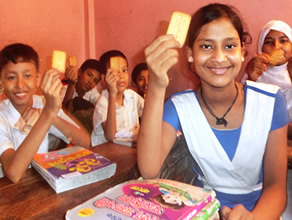
写真-1:クッキーを食べる子どもたち
2.GENKIプログラム改善のための保護者会
今月はGENKIプログラム改善のため、学校や母親たちとともに実施している保護者会についてご紹介します。1か月に1度、学校の協力を得て母親たちに学校へ来てもらい、プログラムについて話し合う保護者会を実施しています。スラム街の学校では、生徒数に関わらず飲み水用の水道が1校に2つか3つしかありません。プログラム対象校は平均300人規模の学校のため、休み時間には水道の前に長い列ができます。先生より「ユーグレナクッキーを食べた後、子どもたちは水を飲みたくなるが、食べた直後に水を飲むことが難しい」といった話がありました。多くの母親たちは日々の生活を送ることに精一杯で、子どもの学校生活に関心を持つ余裕がないのが現実です。問題解決のために先生とスタッフは話し合い、水筒替わりとして空のペットボトルに飲料水を入れて子どもたちに持たせるよう、母親たちに協力をお願いしました。
その結果、子どもたちは毎日家から飲料水を入れたペットボトルを持参し、飲みたいときに水を飲めるようになりました。この提案が学校生活の一部改善に繋がったことを嬉しく思います。
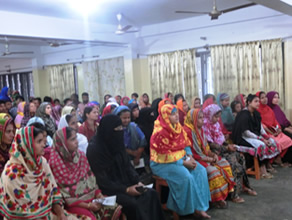
写真-2:母親との話し合い風景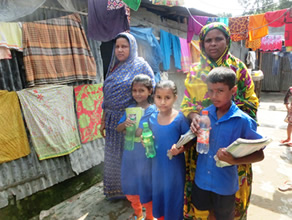
写真-3:飲料水を持って学校にいく母親と子どもたち
3.スラム街に学校をつくった校長先生の紹介
GENKIプログラム対象校の多くがスラム街にあります。今回は自らスラム街にマトリチャチアビッダニケトン学校 (Matrichaia Bidda Niketon School)を設立した校長先生を紹介します。
トスリマ校長先生は裕福な家庭に育ちました。大学院を卒業したのち、結婚し専業主婦として生活していましたが、26歳の時に夫に先立たれてしまいました。悲しみに暮れていたさなか、教員免許を持っていた彼女に、何か子どものために活動することを兄から提案され、スラム街に住む子どもたちを支援する活動に参加しました。その活動を通じ、まずは子どもたちが教育を身につけることが大切と考え、兄が経営する会社から資金を集め、2011年にスラム街に学校をつくりました。開校当時は生徒集めがとても大変で、彼女は一軒一軒家庭を訪問し、学校に来るよう親たちと子どもを説得してまわりました。徐々に生徒の数が増え、開校時に192人だった生徒数が、現在363人と倍に増えています。今では彼女はスラム街で母親のように慕われる存在です。
現在、学校は約300円の授業料と、彼女の兄の会社からの支援金によって運営されています。彼女はGENKIプログラムに対しても非常に協力的で、円滑にプログラムが進められるように先生と親たちに働きかけています。トスリマ校長先生のさらなる夢は、学校があるスラム街の子どもたち全員にクッキーを配布できるよう学校をいっそう大きくすることです。
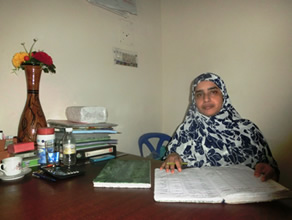
写真-4:トスリマ校長先生
4.ロヒンギャ難民を支援する学校の話
現在、バングラデシュではイスラム系少数民族ロヒンギャが弾圧を逃れてミャンマー西部ラカイン州からバングラデシュへ流入している問題があります。日本ではあまり知られていないロヒンギャ難民の過酷な状況が、現地では日々報道されています。国連機関によると、今年8月以降にミャンマーからバングラデシュに逃れた難民は60万人を超えました。難民はバングラデシュ南東端に位置するコックスバザールの難民キャンプで生活しています。現地でも政府やNGO、企業などが資金や物資を送る援助を行っています。今回はGENKIプログラム対象校が行った支援活動を紹介します。
オーバットヘルパー学校(OBAT Helper School)はNGOがビハリ族※の子どもたちを支援する学校です。同じく難民として暮らす彼らにとって、今回の出来事は非常に胸が痛みました。NGO職員がキャンプへ物資支援を行うことを聞いた先生は、自分たちに何ができるのか子どもたちと一緒に話し合いました。学校に寄付のための箱を設け、着なくなった服や乾燥食品、ろうそく、マッチなどを持ち寄りました。また、子どもたちは「週2回のお菓子代20タカ (約30円)を1回分10タカ(15円)にして、残り10タカをロヒンギャ難民に寄付しよう!」と話し、ビハリキャンプに住む人々にも声をかけ約5,000円の募金を集めました。この資金をNGOの支援金とあわせ、難民キャンプへビニールシートを届けました。
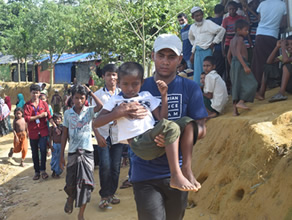
写真-5:難民キャンプで支援するNGO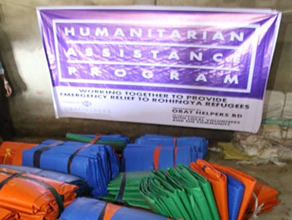
写真-6:NGOとビハリ族が集めたお金で送ったシート
※ビハリ族は、バングラデシュが東パキスタンだった時代にインド・西パキスタン(現パキスタン)から移住したイスラム教徒で、パキスタンの公用語ウルドゥー語を公用語とする民族です。バングラデシュ独立戦争時に西パキスタンを支持し、バングラデシュ独立後パキスタンに帰国することができず、無国籍のままバングラデシュ国内のビハリキャンプで暮らしています。
引き続きご支援よろしくお願い致します。
株式会社ユーグレナ
海外事業開発部 / バングラデシュ事務所

